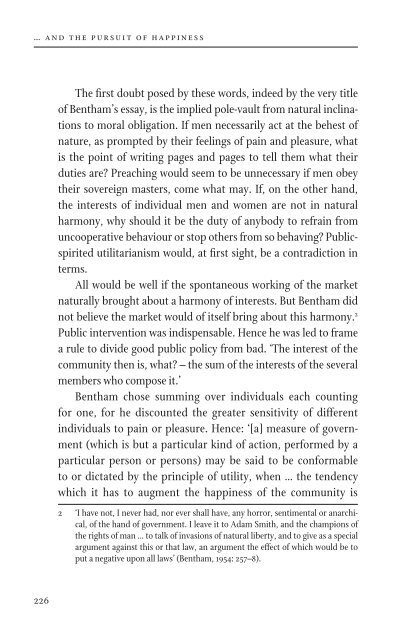… and the Pursuit of Happiness - Institute of Economic Affairs
… and the Pursuit of Happiness - Institute of Economic Affairs
… and the Pursuit of Happiness - Institute of Economic Affairs
Create successful ePaper yourself
Turn your PDF publications into a flip-book with our unique Google optimized e-Paper software.
<strong>…</strong> <strong>and</strong> <strong>the</strong> pursuit <strong>of</strong> happiness<br />
happiness is not within <strong>the</strong> government’s remit<br />
The first doubt posed by <strong>the</strong>se words, indeed by <strong>the</strong> very title<br />
<strong>of</strong> Bentham’s essay, is <strong>the</strong> implied pole-vault from natural inclinations<br />
to moral obligation. If men necessarily act at <strong>the</strong> behest <strong>of</strong><br />
nature, as prompted by <strong>the</strong>ir feelings <strong>of</strong> pain <strong>and</strong> pleasure, what<br />
is <strong>the</strong> point <strong>of</strong> writing pages <strong>and</strong> pages to tell <strong>the</strong>m what <strong>the</strong>ir<br />
duties are? Preaching would seem to be unnecessary if men obey<br />
<strong>the</strong>ir sovereign masters, come what may. If, on <strong>the</strong> o<strong>the</strong>r h<strong>and</strong>,<br />
<strong>the</strong> interests <strong>of</strong> individual men <strong>and</strong> women are not in natural<br />
harmony, why should it be <strong>the</strong> duty <strong>of</strong> anybody to refrain from<br />
uncooperative behaviour or stop o<strong>the</strong>rs from so behaving? Publicspirited<br />
utilitarianism would, at first sight, be a contradiction in<br />
terms.<br />
All would be well if <strong>the</strong> spontaneous working <strong>of</strong> <strong>the</strong> market<br />
naturally brought about a harmony <strong>of</strong> interests. But Bentham did<br />
not believe <strong>the</strong> market would <strong>of</strong> itself bring about this harmony. 2<br />
Public intervention was indispensable. Hence he was led to frame<br />
a rule to divide good public policy from bad. ‘The interest <strong>of</strong> <strong>the</strong><br />
community <strong>the</strong>n is, what? – <strong>the</strong> sum <strong>of</strong> <strong>the</strong> interests <strong>of</strong> <strong>the</strong> several<br />
members who compose it.’<br />
Bentham chose summing over individuals each counting<br />
for one, for he discounted <strong>the</strong> greater sensitivity <strong>of</strong> different<br />
individuals to pain or pleasure. Hence: ‘[a] measure <strong>of</strong> government<br />
(which is but a particular kind <strong>of</strong> action, performed by a<br />
par ticular person or persons) may be said to be conformable<br />
to or dictated by <strong>the</strong> principle <strong>of</strong> utility, when <strong>…</strong> <strong>the</strong> tendency<br />
which it has to augment <strong>the</strong> happiness <strong>of</strong> <strong>the</strong> community is<br />
2 ‘I have not, I never had, nor ever shall have, any horror, sentimental or anarchical,<br />
<strong>of</strong> <strong>the</strong> h<strong>and</strong> <strong>of</strong> government. I leave it to Adam Smith, <strong>and</strong> <strong>the</strong> champions <strong>of</strong><br />
<strong>the</strong> rights <strong>of</strong> man <strong>…</strong> to talk <strong>of</strong> invasions <strong>of</strong> natural liberty, <strong>and</strong> to give as a special<br />
argument against this or that law, an argument <strong>the</strong> effect <strong>of</strong> which would be to<br />
put a negative upon all laws’ (Bentham, 1954: 257–8).<br />
greater than any which it has to diminish it’. 3<br />
This really was no help in answering <strong>the</strong> question: why<br />
should anyone sacrifice her or his interest for <strong>the</strong> sake <strong>of</strong> <strong>the</strong><br />
common weal? Why indeed should people in power care for <strong>the</strong><br />
interest <strong>of</strong> <strong>the</strong> public ra<strong>the</strong>r than <strong>the</strong>ir own? Why should <strong>the</strong><br />
losers in <strong>the</strong> social welfare calculus be reconciled to <strong>the</strong> need<br />
to attain social harmony at <strong>the</strong>ir cost? There could only be one<br />
answer – to wit, that on <strong>the</strong> basis <strong>of</strong> rational long-term calculation<br />
such a sacrifice <strong>of</strong> short-term interests could be shown to<br />
be for <strong>the</strong> good <strong>of</strong> all. But this would have to be on condition<br />
that o<strong>the</strong>r people would also be rational in this manner – or be<br />
made to behave rationally. An enlightened despot was needed<br />
to enforce ‘rational’ behaviour on recalcitrants or, if <strong>the</strong>re was<br />
no despot <strong>of</strong> this kind, a body <strong>of</strong> citizens organised by a democratic<br />
constitution. 4<br />
The point here is that <strong>the</strong> general acquiescence to <strong>the</strong> rule<br />
<strong>of</strong> an enlightened utilitarian despot or <strong>the</strong> agreement on a utilitarian<br />
constitution implies that a society can be organised around<br />
<strong>the</strong> single overarching principle <strong>of</strong> <strong>the</strong> maximisation <strong>of</strong> <strong>the</strong> sum<br />
<strong>of</strong> happiness. The logical difficulty <strong>of</strong> moving from is to ought<br />
disappears when <strong>the</strong>re are no ‘oughts’ to choose from, only one<br />
3 By this, <strong>of</strong> course, he meant <strong>the</strong> sum <strong>of</strong> pleasure or happiness net <strong>of</strong> pain. There<br />
could be o<strong>the</strong>r public rules starting from <strong>the</strong> same pain–pleasure psychology <strong>of</strong><br />
individuals, such as Rawls’s second principle <strong>of</strong> Justice which favours <strong>the</strong> poor.<br />
4 Bentham’s first efforts were indeed directed at convincing <strong>the</strong> powerful, e.g.<br />
Ca<strong>the</strong>rine <strong>of</strong> Russia. It was only around 1809, when he was in his sixties, that<br />
Bentham began to see that as a practical <strong>the</strong>ory his utilitarianism was incomplete<br />
unless embedded in radical democracy. He thus started a fruitful line <strong>of</strong> research<br />
that culminated in his unfinished Constitutional Code (1830). He <strong>the</strong>re drew up interesting<br />
institutional devices to align <strong>the</strong> interests <strong>of</strong> governors <strong>and</strong> governed, a<br />
clear anticipation <strong>of</strong> public choice <strong>the</strong>ory <strong>and</strong> <strong>the</strong> law <strong>and</strong> economics movement:<br />
Dinwiddy (2003 [1975]).<br />
226 227












